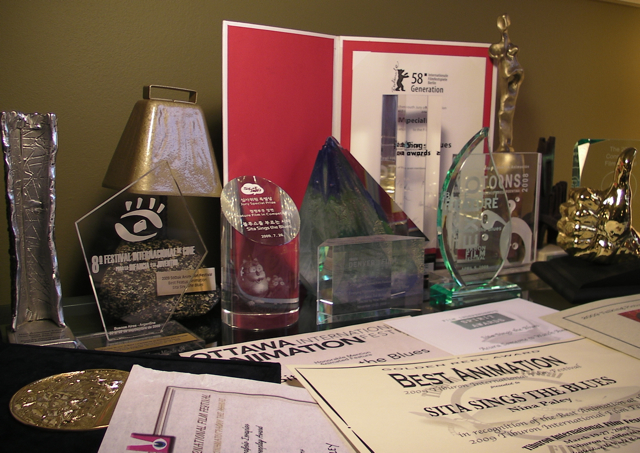 “What’s stopping ME from selling ‘Sita’ DVDs and merch?” I usually get this question from slightly shocked artists and filmmakers after Sita Sings the Blues talks. I’m not stopping them, and the law isn’t stopping them. Yet for some reason, they don’t go out and sell Sita merch once they know this. Why?
“What’s stopping ME from selling ‘Sita’ DVDs and merch?” I usually get this question from slightly shocked artists and filmmakers after Sita Sings the Blues talks. I’m not stopping them, and the law isn’t stopping them. Yet for some reason, they don’t go out and sell Sita merch once they know this. Why?
I can guess the answer, of course:
expensive
big hassle
DVDs & merch already exist & are available
insufficient incentive to compete
have other, more important things to do
When one artist-filmmaker I know well asked the question, I boldly answered, “nothing – but you won’t.” I know she won’t because she has enough trouble merchandising and promoting her own work; and she’s a good artist, so I know she’ll remain more devoted to her own work than to mine.
That said, a few people (other than me and my Endorsed distributors) are selling Sita merch. One such is Drakar, who also distributed Sita on youtube and elsewhere online. He recently created a small CafePress online shop.
He didn’t ask for my permission or Endorsement*, but states, “This shop is not run by Nina but I will be giving her a significant portion of any profits I might make here (…if and when).” I actually prefer that to negotiating an Endorsement for small-scale projects, because it requires no lawyers or signed contracts. For small amounts of money, who wants to waste any of it on transaction costs?
*Full disclosure: he did email me for some design artwork he couldn’t find online, which I supplied, so the store wasn’t a complete surprise.
In general, I would much prefer you bought Sita merch from the Sita Merch Empire than from a CafePress store. Reasons include: I know the Merch Empire merch is high quality, I personally designed and like all the products there, and a much higher % of the money goes to me. CafePress merch tends to be overpriced for the quality, and CafePress takes almost all the profits unless the seller sets prices absurdly high.
That said, Drakar’s store offers Sita merch that doesn’t exist at the Merch Empire. If I offered mugs, mousepads and stickers, he wouldn’t have needed to make a Cafe Press store in the first place. If he actually sells any, it will demonstrate there is demand for such products. Then I can offer the same or similar products at my store. Drakar is essentially providing free market research, as are any other “competitors.” If any of them do exceptionally well, I’ll know what merch I should be selling.
This is why old-school economists say competition is good for businesses. It is. Too bad there’s so little real competition in our supposedly “free market democracy”.
What’s stopping you from selling ‘Sita’ merch? Not me, and not the law. Yet almost no one’s doing it. Why? What really is stopping you?



